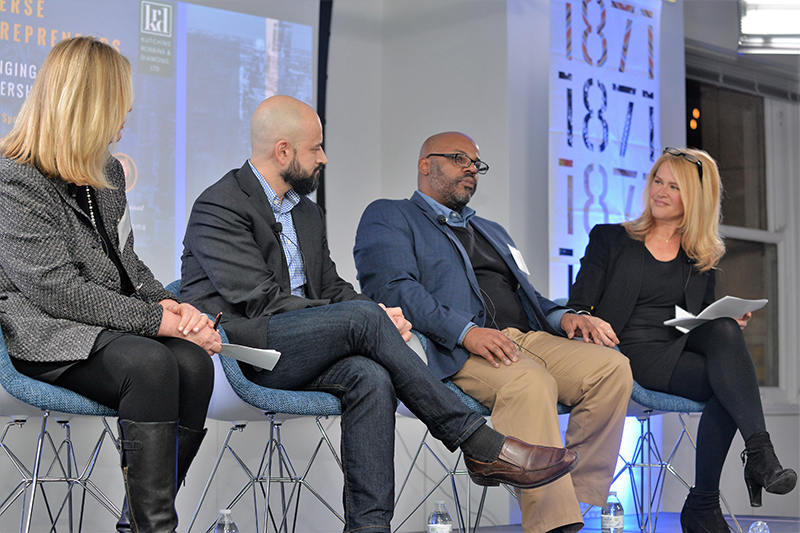
The Coleman Entrepreneurship Center hosted a symposium focused on diversity in entrepreneurship. The following panelists participated in a discussion on the symposium's theme (from left to right): Joan Hannant, CEO of the Soma Institute; Omar Duque, president and CEO of the Illinois Hispanic Chamber of Commerce; Lawrence Hamer, marketing professor and associate provost for academics and faculty affairs at DePaul; and panel moderator Kristi Ross, co-CEO and president at tastytrade.
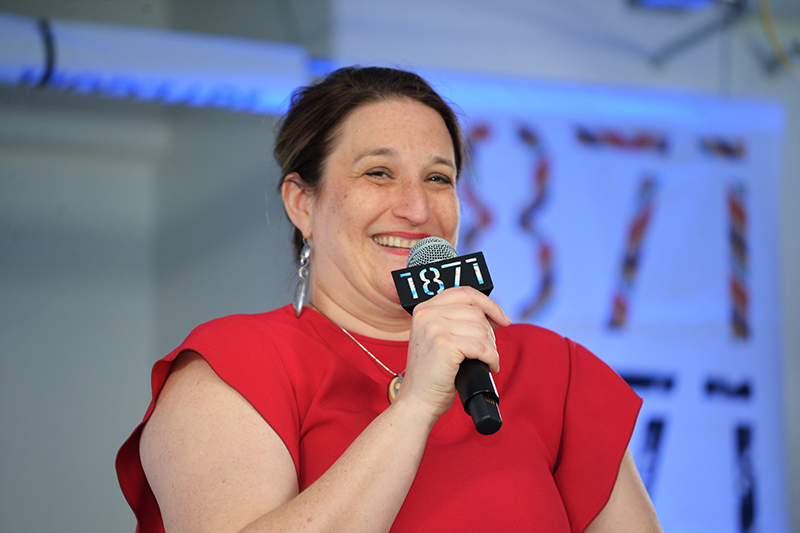
Symposium keynote speaker Genevieve Thiers, founder of Sittercity.com, spoke about her struggles as a woman trying to raise venture capital to start her business.
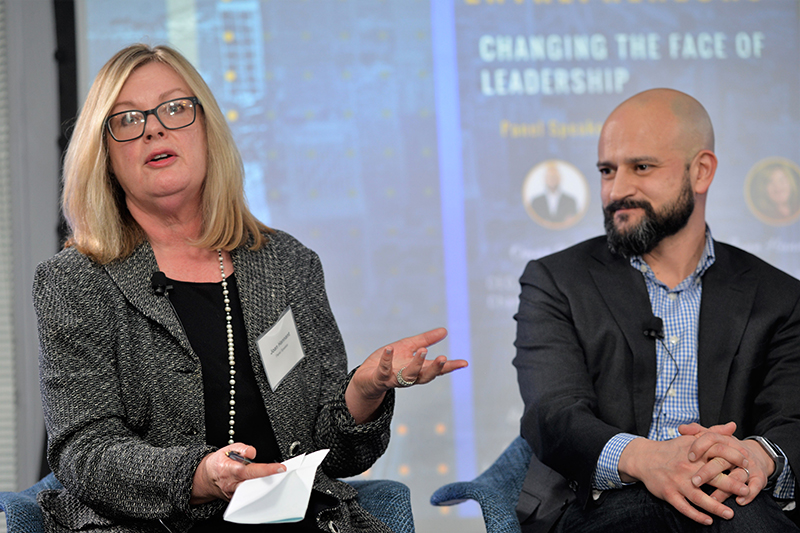
Joan Hannant, CEO of the Soma Institute and who serves on the Coleman Center's advisory board, discussed the difficulties starting and scaling a business as a woman during the panel discussion. Also pictured (right) is panel speaker Omar Duque, president and CEO of the Illinois Hispanic Chamber of Commerce.
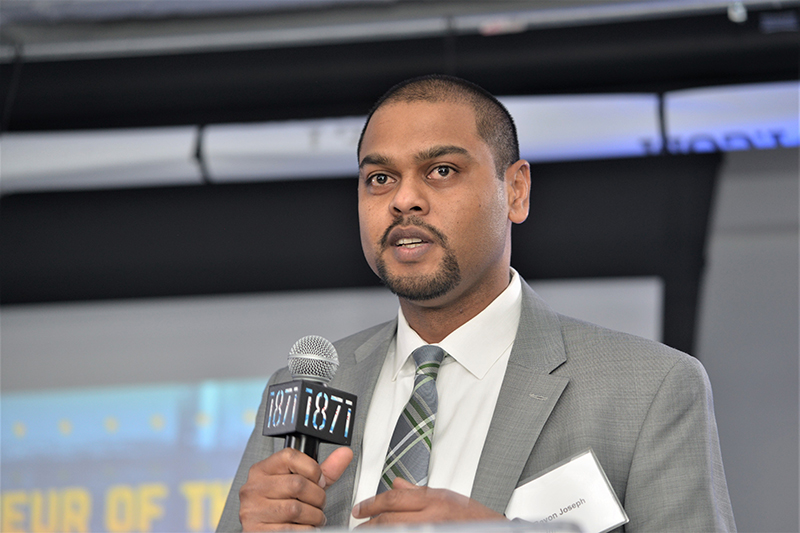
Bevon Joseph (MS '19) received the Coleman Center's Student Entrepreneur of the Year Award. Joseph is founder of the Greenwood Project, a nonprofit that facilitates internship opportunities for minorities.
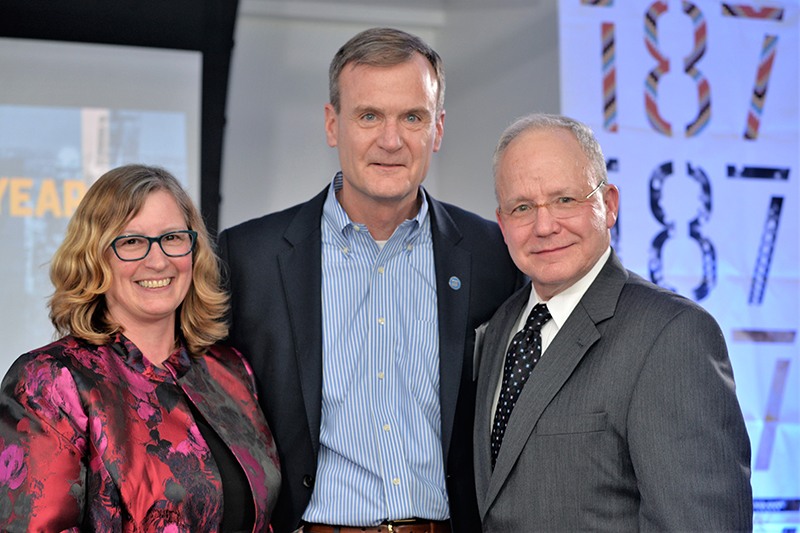
Terry Steinbach (BA '88, MBA '90, MS '99, Phd '08), associate dean for Information Systems and Education at DePaul's Jarvis College of Computing and Digital Media, won the Entrepreneurial Academic of the Year award. From left to right: Steinbach; Bruce Leech, executive director, Coleman Center; and Michael W. Hennessy, president and CEO of the Coleman Foundation.

Adam Robinson (MBA '03), co-founder and CEO of Hirelogy, received the Coleman Center's Emerging Entrepreneurship of the Year award.
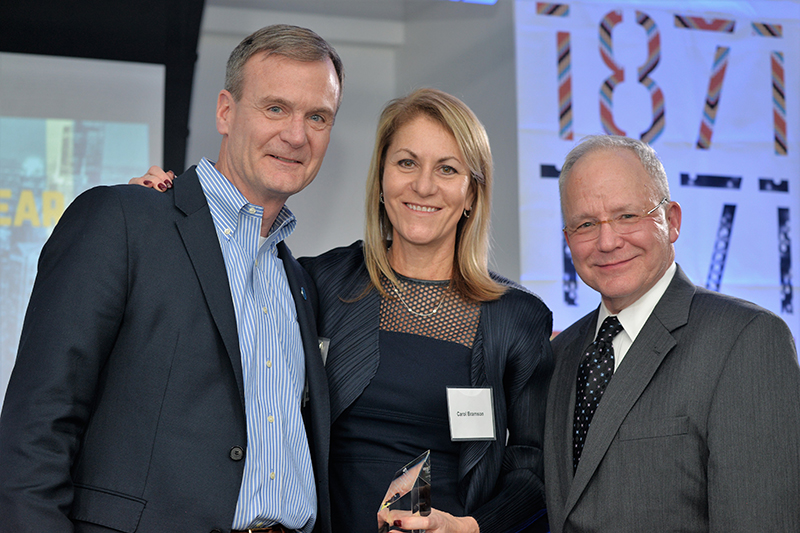
Carol Bramson (BUS '89), investor and CEO, won the Distinguished Entrepreneur of the Year award. From lef to right: Bruce Leech, executive director of the Coleman Center; Bramson; and Michael W. Hennessy, president and CEO of the Coleman Foundation.
More than 350 people attended the
Coleman Entrepreneurship Center’s symposium “Diverse Entrepreneurs: Changing the Face of Leadership” at 1871. Four panelists and one keynote speaker told their personal stories on starting their businesses, and also addressed efforts being made toward inclusive entrepreneurship at DePaul University.
Coleman Executive Director Bruce Leech says it’s important for DePaul to create awareness and conversation around diversity in entrepreneurship for both current students and alumni.
“I think by having this message publicly displayed in the form of the symposium, with 375 people in the room hearing that message, it helps remove the fear from people who otherwise might feel they don’t have what it takes to take that first step in starting a business,” Leech says.
The panel speakers included Omar Duque, president and CEO of the Illinois Hispanic Chamber of Commerce; Lawrence Hamer, marketing professor and associate provost for academics and faculty affairs at DePaul; and Joan Hannant, who serves as CEO at the Soma Institute. Kristi Ross, co-CEO and president at tastytrade, moderated the panel discussion.
The Coleman Center also awarded four DePaul alumni for their efforts in entrepreneurship. The winners include:
- Bevon Joseph (MS '19), founder of the Greenwood Project, winner of
the Student Entrepreneur of the Year award
- Adam Robinson (MBA '03), co-founder and CEO of Hireology, winner of the Emerging Entrepreneur of the Year Award
- Terry Steinbach (BA '88, MBA '90, MS '99, Phd '08), associate dean for Information Systems and Education at DePaul's Jarvis College of Computing and Digital Media, winner of the Entrepreneurial Academic of the Year award
- Carol Bramson (BUS '89), investor and CEO; founder, TBG Capital; winner of the Distinguished Entrepreneur of the Year award
Keynote speaker Genevieve Thiers , founder of Sittercity.com, spoke about her struggles as a woman trying to raise venture capital to start her business. Hannant, who serves on the Coleman Center’s advisory board, also discussed the difficulties starting and scaling a business as the only woman in the room during business meetings.
According to Harvard Business Review, only 2 percent of venture capital funding was awarded to women-led companies in 2016, despite owning 38 percent of the businesses in the country.
“Starting a business is hard enough and many women find it even more difficult because of the systematic barriers to entry and growth,” says Hannant, who started her business in 1998. "While the gender gap in business has not been closed, the gender gap in the start-up community has an even longer way to go before it is closed."